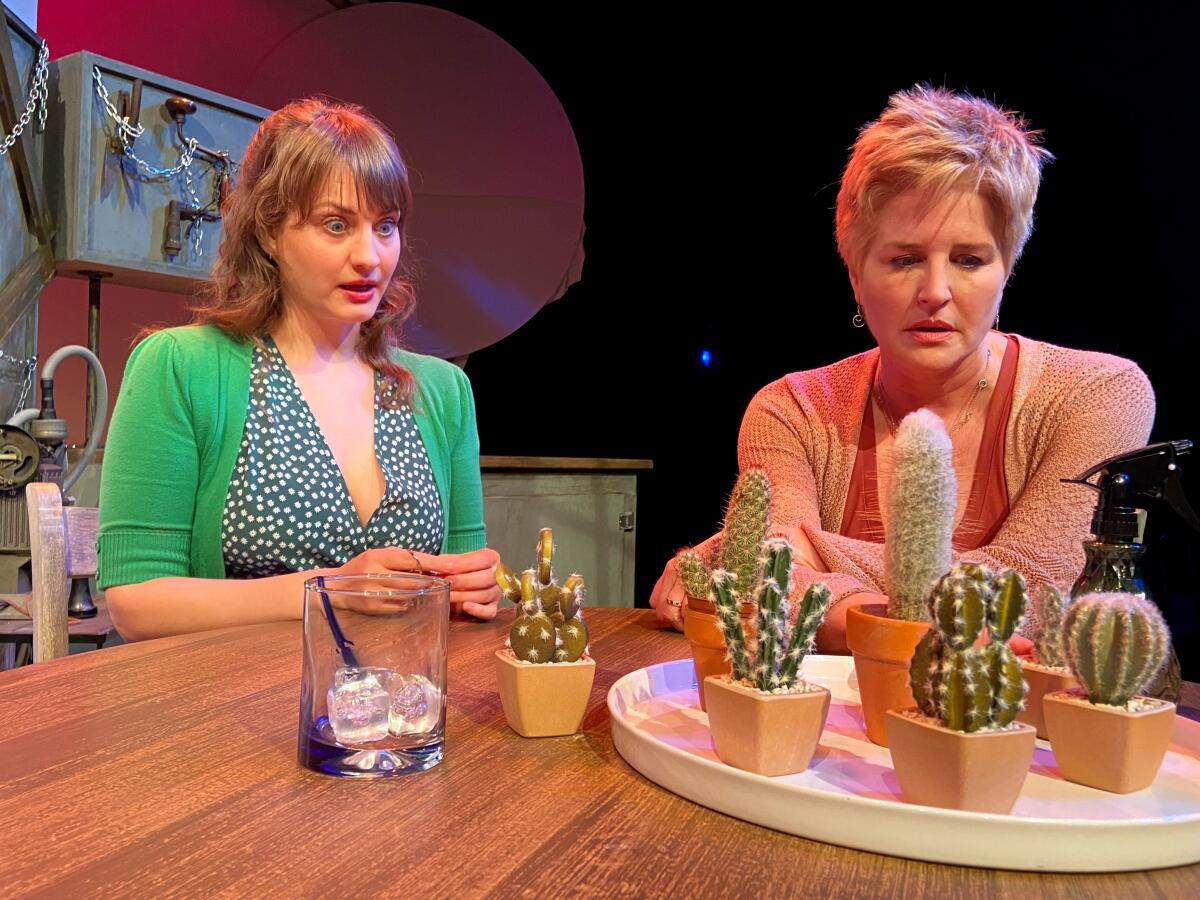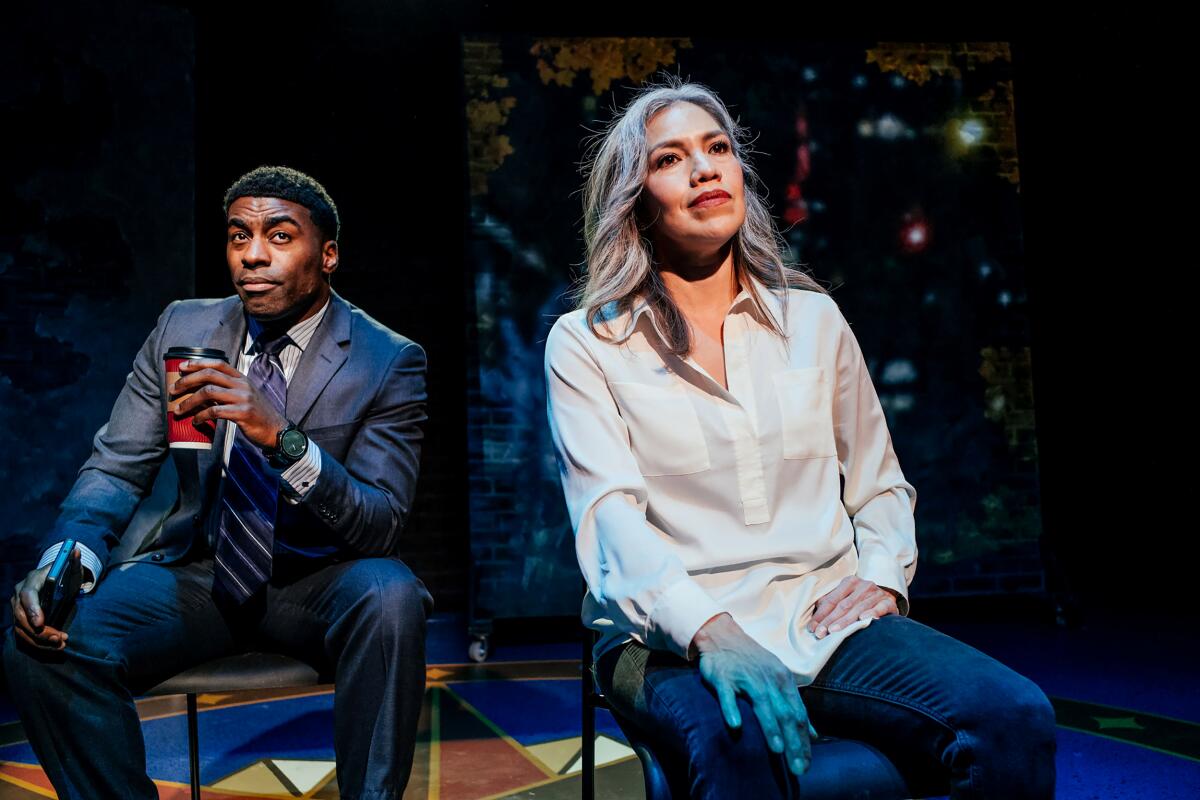Commentary: For better or worse, two new plays reveal their writers’ TV backgrounds

- Share via
Two plays by writers who work extensively in television call attention to crucial differences between stage and screen. Perhaps the biggest of all has to do with the centrality of plot.
TV tries to hook an audience with story. Theater, while hardly indifferent to the power of a good tale, cares at least as much about the manner of telling and a good deal more about what it all means.
Both “Mercury” by Steve Yockey (the creator and showrunner of HBO Max’s “The Flight Attendant” and Netflix’s “Dead Boy Detectives”) and “Middle of the World” by Juan José Alfonso (an actor and producer whose program bio includes executive roles on the Marvel Studios series “Agent Carter” and Starz’s “Gaslit”) spin yarns that travel to places the theater isn’t accustomed to visiting.
Audience members might find themselves muttering, “Wait, what?!?” as surprising setups give rise to improbable twists.
“Mercury,” a Road Theatre production directed by Ann Hearn Tobolowsky at the NoHo Senior Arts Colony, is a supernatural thriller with an eccentric sense of humor. Yockey, who was a co-executive producer on the series “Supernatural,” begins his tale, prosaically enough, in a kitchen on the outskirts of Portland, Ore.
But don’t let the suburban decor fool you. Pamela (a deliciously seething Meeghan Holaway), sits at her kitchen table arranging a set of cactuses (one of which is ludicrously phallic), belting Scotch and simmering with rage. Heather (Andrea Flowers), her married neighbor, has stopped by to inquire about her missing dog, Mr. Bundles, and also to smooth things over after breaking up their illicit affair.
For Pamela, revenge is a dish best served with garden shears. But nothing will prepare you for the expert way Yockey reveals the shocking things ordinary people will do when they feel they’ve been manipulated and dismissed. “Mercury” proceeds to a curiosity shop in Portland whose storeroom sounds like it might lie next to the gates of hell. The play then moseys along to another kitchen occupied by a bickering gay couple who are fending off a busybody neighbor with a grudge and passes through some “Twilight Zone” version of Hades before reentering the Portland area via the guts of a bear.
Yes, you read that right: the guts of a bear.
“Middle of the World,” a Rogue Machine production at the Matrix Theatre directed by artistic director Guillermo Cienfuegos, is a political drama that steers clear of the occult but dives into a CIA conspiracy with consequences so unlikely that I found myself wondering if parts of this tale might be true. Some stories are indeed stranger than fiction, and this made-up saga strains credulity without having to venture into paranormal places.
The play revolves around a relationship between an ousted Ecuadorean president turned New York Uber driver and her relationship with a younger Black Wall Street type who’s living large off his fat Deutsche Bank salary.

Victoria Rojas (a superb Cheryl Umaña) has a PhD in applied economics and a determination to return to Ecuador to reunite with her son, if not return to power. Glenn (Christian Telesmar, effectively balancing cockiness and diffidence) is a finance bro with a latent conscience that Victoria is trying to raise to the surface, even as she keeps her own guilty past submerged.
Both plays have multiple settings that require scrambling and heavy lifting. “Mercury” theatricalizes the changes of scene by having Alicia (Gloria Ines), who works at the diabolical curiosity shop, spin Katrina Coulourides’ merry-go-round set as though it were the wheel of fortune.
“Middle of the World,” by contrast, struggles to keep up with a story that moves twitchily from one locale to the next. Scenic designer Nicholas Hewitt keeps things simple with minimal set pieces, but the play keeps hurrying from car to office to coffee shop to bar to apartment — and that’s just in New York. The Ecuador flashbacks, which would be better handled through exposition, take us to meetings inside the president’s office with a sinister State Department figure (played by Leandro Cano). The cumbersome logistics suggest that the playwright isn’t thinking in stage terms.
Theater demands economy not simply for practical reasons but also for poetic ones. A stage play cannot compete on realistic grounds with a limited television series or feature film. But restriction is the mother of invention. Playwrights turn to language, theatrical metaphor and scenic choreography to expand the stage’s expressive potential.
A drama that would work better as a teleplay is neglecting theater’s intrinsic resources. But it’s also distracting itself from discovering the soul of its story.
“Middle of the World,” which had its world premiere under the direction of Cienfuegos at Boise Contemporary Theatre, would be stronger if, instead of continually branching forward and backward, it would concentrate on the May-December mentoring romance between Victoria and Glenn.
Umaña endows Victoria with a fiery dignity that doesn’t need the replay of her fraught last days in office. The scenes in Ecuador reek of made-for-TV contrivance. Telesmar, who was so memorable in Rogue Machine’s production of “On the Other Hand, We’re Happy,” can only do so much with Glenn, a character whose backstory is brought out like a suit of clothes plucked off the Nordstom rack.
The bifurcated ending of “Middle of the World” leaves us in the middle of nowhere. Alfonso reaches for symbolism, but his restless drama doesn’t earn its epiphany on the way out. What’s compelling about the play — the catalytic effect Victoria and Glenn have on each other — gets lost in the thicket of the plot.
Horror as a theatrical genre is having its moment, but it’s not easy to pull off. Yockey, a prolific playwright with a noteworthy TV résumé, succeeds by convincingly setting up the ordinary before shattering it with supernatural phenomenon.
“Mercury,” which is receiving its West Coast premiere, is composed of independent vignettes that eventually interlock. What the characters have in common is the mysterious curiosity shop, which sells various forms of what might be called karmic retribution.
Alicia, the ominously cheerful salesperson, is a New Age type with a malevolent side. Olive (Christina Carlisi), one of her returning customers, is so mousy she cannot get herself to ring the bell at the register, yet what she’s come in for is nothing short of murderous.
Holaway’s Pamela, Flower’s Heather and Carlisi’s Olive are all the more frightening for being so recognizable. The gay relationship between Nick (Justin Lawrence Barnes) and Brian (Danny Lee Gomez) — which Olive, their easily annoyed downstairs neighbor, is determined to put an end to one way or another — has believable textures but not enough to involve us emotionally.
When Sam (Billy Baker), Alicia’s curiosity shop partner-in-crime, enters the picture, the play has a psychotic break. Miraculously, it works. The blend of gallows humor and gruesome fright is enlivening, casting a strange yet fiendishly compelling spell.
The finely tuned ensemble lives credibly in the madness of the escalating situation. But not even Yockey can wring from his tale the psychological moral that he attempts to extract at the end.
The meaning of “Mercury” is consumed in the blazing inferno of the playwright’s imagination. Still, it’s a wild, absorbing ride. Theater can benefit from infusions from other mediums, even if ultimately it must be true to itself.
'Mercury'
Where: The Road Company at the Noho Senior Arts Colony, 10747 Magnolia Blvd., North Hollywood.
When: 8 p.m. Feb. 15-17, Feb. 23-24, March 1-2; 2 p.m. Feb. 18, 25.
Running time: 1 hour, 30 minutes, no intermission.
Tickets: $39
Info: (818) 761-8838 or RoadTheatre.org
‘Middle of the World'
Where: Rogue Machine (in the Matrix Theatre), 7657 Melrose Ave., L.A.
When: 8 p.m. Feb. 16-17, 23-24, 26, March 1-2, 4; 3 p.m. Feb. 18, 25, March 3.
Running time: 1 hour, 35 minutes
Tickets: $45
Info: (855) 585-5185 or roguemachinetheatre.org
More to Read
The biggest entertainment stories
Get our big stories about Hollywood, film, television, music, arts, culture and more right in your inbox as soon as they publish.
You may occasionally receive promotional content from the Los Angeles Times.










